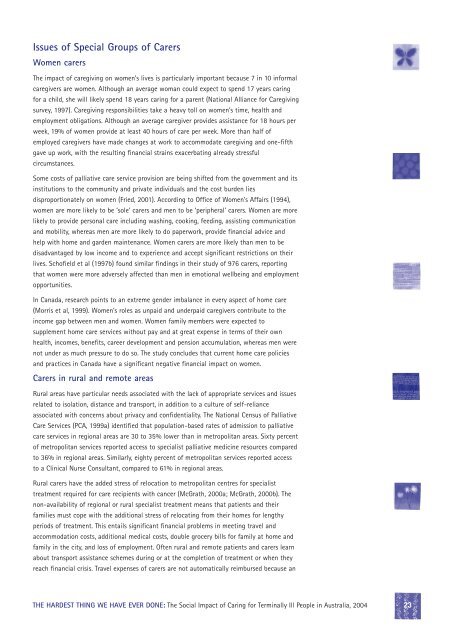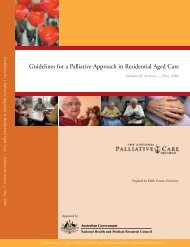The hardest thing we have ever done - Palliative Care Australia
The hardest thing we have ever done - Palliative Care Australia
The hardest thing we have ever done - Palliative Care Australia
You also want an ePaper? Increase the reach of your titles
YUMPU automatically turns print PDFs into web optimized ePapers that Google loves.
Issues of Special Groups of <strong>Care</strong>rs<br />
Women carers<br />
<strong>The</strong> impact of caregiving on women’s lives is particularly important because 7 in 10 informal<br />
caregivers are women. Although an average woman could expect to spend 17 years caring<br />
for a child, she will likely spend 18 years caring for a parent (National Alliance for <strong>Care</strong>giving<br />
survey, 1997). <strong>Care</strong>giving responsibilities take a heavy toll on women’s time, health and<br />
employment obligations. Although an average caregiver provides assistance for 18 hours per<br />
<strong>we</strong>ek, 19% of women provide at least 40 hours of care per <strong>we</strong>ek. More than half of<br />
employed caregivers <strong>have</strong> made changes at work to accommodate caregiving and one-fifth<br />
gave up work, with the resulting financial strains exacerbating already stressful<br />
circumstances.<br />
Some costs of palliative care service provision are being shifted from the government and its<br />
institutions to the community and private individuals and the cost burden lies<br />
disproportionately on women (Fried, 2001). According to Office of Women’s Affairs (1994),<br />
women are more likely to be ‘sole’ carers and men to be ‘peripheral’ carers. Women are more<br />
likely to provide personal care including washing, cooking, feeding, assisting communication<br />
and mobility, whereas men are more likely to do paperwork, provide financial advice and<br />
help with home and garden maintenance. Women carers are more likely than men to be<br />
disadvantaged by low income and to experience and accept significant restrictions on their<br />
lives. Schofield et al (1997b) found similar findings in their study of 976 carers, reporting<br />
that women <strong>we</strong>re more adversely affected than men in emotional <strong>we</strong>llbeing and employment<br />
opportunities.<br />
In Canada, research points to an extreme gender imbalance in <strong>ever</strong>y aspect of home care<br />
(Morris et al, 1999). Women’s roles as unpaid and underpaid caregivers contribute to the<br />
income gap bet<strong>we</strong>en men and women. Women family members <strong>we</strong>re expected to<br />
supplement home care services without pay and at great expense in terms of their own<br />
health, incomes, benefits, career development and pension accumulation, whereas men <strong>we</strong>re<br />
not under as much pressure to do so. <strong>The</strong> study concludes that current home care policies<br />
and practices in Canada <strong>have</strong> a significant negative financial impact on women.<br />
<strong>Care</strong>rs in rural and remote areas<br />
Rural areas <strong>have</strong> particular needs associated with the lack of appropriate services and issues<br />
related to isolation, distance and transport, in addition to a culture of self-reliance<br />
associated with concerns about privacy and confidentiality. <strong>The</strong> National Census of <strong>Palliative</strong><br />
<strong>Care</strong> Services (PCA, 1999a) identified that population-based rates of admission to palliative<br />
care services in regional areas are 30 to 35% lo<strong>we</strong>r than in metropolitan areas. Sixty percent<br />
of metropolitan services reported access to specialist palliative medicine resources compared<br />
to 36% in regional areas. Similarly, eighty percent of metropolitan services reported access<br />
to a Clinical Nurse Consultant, compared to 61% in regional areas.<br />
Rural carers <strong>have</strong> the added stress of relocation to metropolitan centres for specialist<br />
treatment required for care recipients with cancer (McGrath, 2000a; McGrath, 2000b). <strong>The</strong><br />
non-availability of regional or rural specialist treatment means that patients and their<br />
families must cope with the additional stress of relocating from their homes for lengthy<br />
periods of treatment. This entails significant financial problems in meeting travel and<br />
accommodation costs, additional medical costs, double grocery bills for family at home and<br />
family in the city, and loss of employment. Often rural and remote patients and carers learn<br />
about transport assistance schemes during or at the completion of treatment or when they<br />
reach financial crisis. Travel expenses of carers are not automatically reimbursed because an<br />
THE HARDEST THING WE HAVE EVER DONE: <strong>The</strong> Social Impact of Caring for Terminally Ill People in <strong>Australia</strong>, 2004<br />
23
















